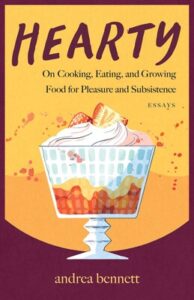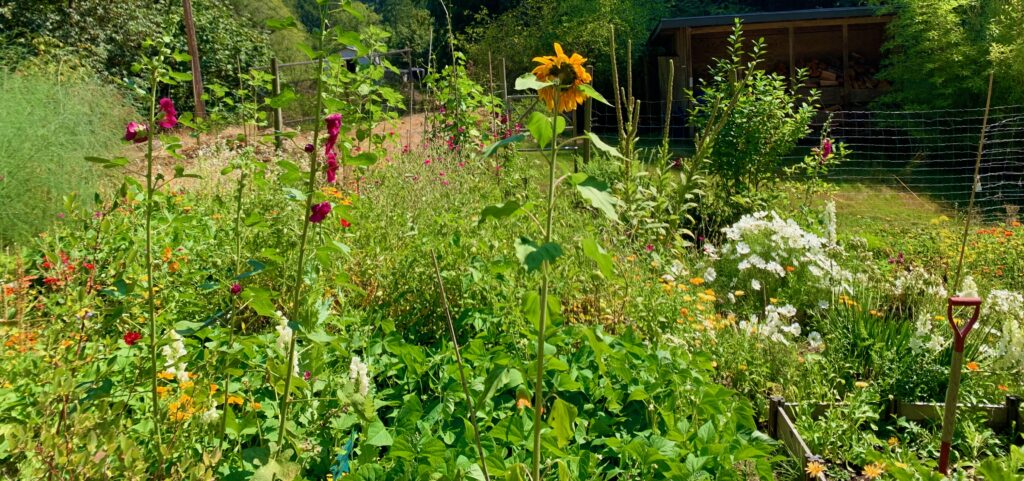Pleasures, from garden to table
Hearty: On Cooking, Eating, and Growing Food for Pleasure and Subsistence
by Andrea Bennett
Toronto: ECW Press, 2024
$24.95 / 9781770411
Reviewed by Brett Josef Grubisic
*

My house on Salt Spring Island is a former fixer-upper. Back in 2018, its status as an indifferently cared for or wholly neglected property extended to the back garden. A large, rounded rectangle enclosed by slumped deer fencing, the patch featured cherry and plum trees that attracted ants but produced no fruit, unkempt lilac bushes surrounded by innumerable suckers, a scattering of alder saplings, lumber for raised beds that had rotted, a colossal compost pit, every weed, grass, and vine species imaginable, and a large, inexplicable assortment of rusted nails. All on a slope, I should add.
Eventually, I cut down the trees and dug out their tenacious roots. Added rows, raised beds, terracing, and pathways.
My partner checked out earlier. After a full day of paid work, gardening was not, he discovered, relaxing. Nor meditative. And while picking and then preparing asparagus, radishes, peas, beans, cucumbers, and tomatoes was undeniably pleasant, all the obligatory toil before that was just that: toil.

I learned too. That I was ambivalent, at best, about gardening. And, fed up in the cool, wet spring of 2024, I indulged in fantasies that involved kerosene and watching with deep satisfaction as the entire garden went up in flames. (Environmentally-conscious even in my fantasies, I later swapped that for rewilding: pulling up the fenceposts, dragging away the wire fence, and letting nature take its course. It’d take about a week, I figured.)
By happy coincidence, I saw a catalogue for fall 2024 titles that listed Hearty. And in its subtitle, “On Cooking, Eating, and Growing Food for Pleasure and Subsistence,” my eyes fixed on “Growing Food for Pleasure.”
Pleasure, eh?
As as essayist, Powell River resident Andrea Bennett (Like a Boy But Not a Boy) is a delight; in no particular order, the author appears enthused, irked, curious, funny, hedonistic, politicized, candid, informative, and nostalgic. And, always, deeply personable. The essays in Hearty will appeal to non-gardeners, gardening pros, and everyone in between. They’re effortless and interesting, and Bennett’s fascination with the subject matter—all of it—is infectious.

Whether discussing (and sharing) their nana’s recipe for tomato chutney, considering the carrot (in “Consider the Carrot,” naturally), try-try-againing with vegan macarons (that Bennett calls “macawrongs”), tackling agri-business (in “Two Bags of Lettuce,” and elsewhere), interviewing small-scale seed farmers, getting hot and bothered about Anthony Bourdain’s contempt for vegetarians, dissing TV food shows (eg, “Food Network’s Pioneer Woman, going into its eleven billionth season and epitomizing the networks non-competition offerings, lacks the punch and creativity of a dry piece of toast”), tracing the history of canned beans, sharing a memory of employment at Guelph’s Curry in a Hurry in the ‘90s—“By then, I was in my early twenties. I vacillated between overachieving and crashing and burning. High grades were then the primary way I understood myself as having value in the world. But I often felt like a garbage person”—reflecting poignantly and productively on family (“My childhood home was chaotic; my parents fought, my mother drank, our bills were overdue,” for instance), gender, and body size, animal rights, and the present day (“The system we have in place now is unsustainable, a miracle, and a mess”), Bennett reveals a keen intelligence and profound caring for the natural world.
Plus, the author coins the term “dirtbag spa water” (fresh cucumber slices and water “refrigerated for a few hours in a large empty Adams peanut butter jar”). Bennett has style.
Across eighteen essays, Bennett combines “journalism, cookery, and some horticulture in order to study the local and the systemic, the personal and the cultural, aiming to understand where we’re coming from and where we could head next.” A personal favourite, “A Fifty-Pound Bag of Potatoes,” covers all that while also tugging on emotions—from happy and witty to several shades of sad.
To my mild dismay, much of the pleasure in Hearty comes from preparing food, which ranges from roasted broccoli to spruce tip ice cream (recipe included) and savouring the results. Revealing the exact pathway to enlightenment—to Zen Gardening—isn’t wholly on Bennett’s mind for much of the book. And when discussing the ups and downs of gardening, the author reaches an outlook that’s hopeful and fantastical (which is to say, gorgeous, luscious, brag-worthy veggies time after time after time) while realistic (well, good luck with that fantasy) too.
In essays like “Pestilence and Abundance” and “The Failure of the Pepper,” Bennett turns thoughtful and yet accepting about gardening’s disappointments and defeats. Some problems, Bennett writes, are not solvable with habitat changes and patience: “Some of them… we just have to learn to live with, like how we have to learn with grief or loss or the guilt of an unfixable trespass against a loved one.”
Gardening, Bennett concludes, is “not simply a life-giving act, an uncomplicated idyll.” A “backyard grim reader” once upon a time, Bennett was preoccupied with picture-perfect abundance, and invested in gardening as a lesson- and wisdom-giving experience through which to “understand patience” and their place in the world. With actual gardening Bennett has learned other lessons instead: to accept some years will be worse than others and—“the real lesson”— that “it’s okay to do my best and not be perfect, not excel, not patiently annihilate every single pest.” The author comes to “embrace periodic mediocrity”: “The garden teaches gratefulness through its bounty and through its funguses, its aphides, its bolted cabbages…. Even when it fails, it provides. Abundance, nourishment, a mediocre crop acting as a foil to last year’s, or next year’s, much better crop; sore muscles, warm sun, a cool breeze from the ocean. Provision.”
The epiphany in “Pestilence and Abundance” is lovely, as epiphanies ought to be, the moment touching. But an earlier image, recounted in “The Failure of the Pepper,” persists: recalling a season of gardening missteps, Bennett summons a scene in their greenhouse when overcome with fury at an underperforming potted bell pepper: “A person who’d built the entirety of their self-worth on their accomplishments and was now accomplishing nothing other than a waste of soil and time, In that moment of overwhelming frustration, temporary self-hatred, a wave of anger I couldn’t quell, I swore and lobbed the pepper plant.”
In Hearty, wisdom, for gardening—and about life, for that matter—isn’t a steady climb to a plateau that’s reached. It’s elusive—possible to grasp, yes, but just as easy to miss altogether or to have slip out of one’s hand. As a state of mind it’s inherently volatile. One moment you’ve arrived at a holistic vision of the Lessons of Gardening and the next you’re in a fury and breaking the glass of your greenhouse. Accept it, deal with it, and move on, Bennett appears to suggest. There’s always another season and another set of tricky conditions to navigate.
[Editor’s note: Andrea Bennett will launch Hearty on October 2 at 32 Lakes Cafe & Bakery, 6812 Alberni Street, Qathet/Powell River, 7pm.]
*

My Two-Faced Luck, the fifth novel by Salt Spring Islander Brett Josef Grubisic, published in 2021 with Now or Never Publishing, is reviewed here by Geoffrey Morrison. A previous novel, Oldness; or, the Last-Ditch Efforts of Marcus O (2018), was reviewed by Dustin Cole. [Editorial note: A BCR editor, Brett Josef Grubisic has reviewed books by Patrick Grace, Cole Nowicki, Tania De Rozario, John Metcalf (ed.), Brandon Reid, Beatrice Mosionier, Hazel Jane Plante, Sam Wiebe, Joseph Kakwinokanasum, Chelene Knight, Lyndsie Bourgon, Gurjinder Basran, and Don LePan for BCR.]
*
The British Columbia Review
Interim Editors, 2023-25: Trevor Marc Hughes (nonfiction), Brett Josef Grubisic (fiction and poetry)
Publisher: Richard Mackie
Formerly The Ormsby Review, The British Columbia Review is an on-line book review and journal service for BC writers and readers. The Advisory Board now consists of Jean Barman, Wade Davis, Robin Fisher, Barry Gough, Hugh Johnston, Kathy Mezei, Patricia Roy, Maria Tippett, and Graeme Wynn. Provincial Government Patron (since September 2018): Creative BC. Honorary Patron: Yosef Wosk. Scholarly Patron: SFU Graduate Liberal Studies. The British Columbia Review was founded in 2016 by Richard Mackie and Alan Twigg.
“Only connect.” – E.M. Forster
2 comments on “Pleasures, from garden to table”
I always find these stories about growing your own food inspiring, especially as someone working with tree surgeons. Gardening and tree care can be tedious, but you eventually learn a lot from doing it. And yes, I agree. It’s fulfilling, but it’s also a love-hate relationship.
I love this and can’t wait to read the book.